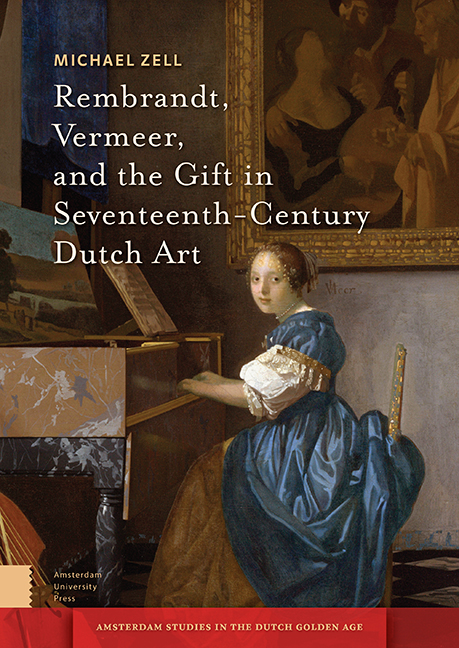Book contents
- Frontmatter
- Dedication
- Contents
- Illustrations
- Acknowledgments
- Introduction
- 1 The Gift and Art in Early Modernity
- 2 Art as Gift in the Dutch Republic
- 3 Rembrandt’s Art as Gift
- 4 Art and Leisure: Amateur Artists, Rembrandt, and Landscape Representation
- 5 For the Love of Art: Vermeer and the Poetics of the Gift
- Conclusion
- Bibliography
- Index
1 - The Gift and Art in Early Modernity
Published online by Cambridge University Press: 21 October 2021
- Frontmatter
- Dedication
- Contents
- Illustrations
- Acknowledgments
- Introduction
- 1 The Gift and Art in Early Modernity
- 2 Art as Gift in the Dutch Republic
- 3 Rembrandt’s Art as Gift
- 4 Art and Leisure: Amateur Artists, Rembrandt, and Landscape Representation
- 5 For the Love of Art: Vermeer and the Poetics of the Gift
- Conclusion
- Bibliography
- Index
Summary
Abstract
This chapter examines the centrality of gift giving to the developing commercial cultures of early modern Europe and the rise to prominence of works of art, especially paintings, in circuits of gift exchange. Contrary to common assumption, gift giving in the early modern period acquired renewed importance as a mode of negotiating professional, social, and personal ties in a rapidly changing, increasingly commercialized environment. Art also emerged as an essential gift currency for negotiating relationships of patronage and clientage, and highly selfconscious artists increasingly turned to the gift's symbolic economy to negotiate with patrons and set their transactions apart from ordinary forms of exchange. I probe the interconnections between gifts and art in various overlapping contexts of early modernity.
Keywords: Gifts; Gift Giving; Art and Money; Diplomatic Gifts; Art Collecting; Caroline Court
Gifts of art proliferated in seventeenth-century Europe, becoming increasingly important to the conduct of international diplomacy and to fostering political, courtly, professional, and social alliances. Artists also embraced gift giving as never before to cultivate relationships of mutual interest and regard with patrons, collectors, contacts, and familiars. This intensified traffic in artworks as gifts reflects the centrality of gift giving in both aristocratic and middle-class behavioral codes, and the rising self-consciousness of artists about their social rank and the status of their work. It is also a revealing feature of the interplay between artistic culture and the developing economic cultures of early modernity. In this period of economic change, gift giving evolved in dynamic relation with Europe's expanding market economy, assuming new meaning and greater potency as an instrument of economic and social negotiation. The anthropological paradigm of the gift defines gift giving as an alternate exchange system involving reciprocity and obligation in contrast to the depersonalized and short-lived social transactions of market or commercial relations. However, historians have made clear that early modern gifts coexisted and interacted with the emerging cultures of market relations and other forms of interpersonal relationships. Whether lavish offerings by princes or aristocrats or more modest presentations by merchants or artists themselves, gifts of art rhetorically claimed exemption from ordinary social transactions and methods of valuation while remaining thoroughly entangled with them. In order to set the stage for investigating the distinctive character of Dutch gifts of art, this chapter first explores the evolution of theories of the gift and their importance for understanding gift giving's role in the changing economic and social structures of early modern Europe.
- Type
- Chapter
- Information
- Publisher: Amsterdam University PressPrint publication year: 2021



